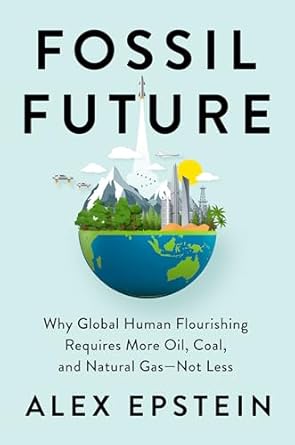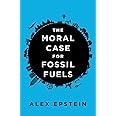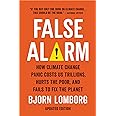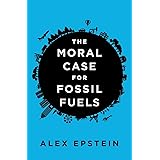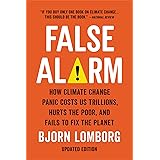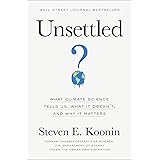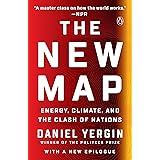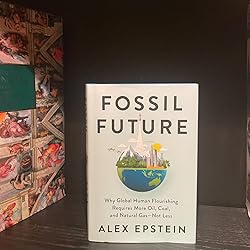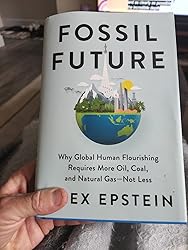Buy new:
-26% $22.33$22.33
Save with Used - Good
$12.64$12.64
Ships from: Amazon Sold by: Tactic Products

Download the free Kindle app and start reading Kindle books instantly on your smartphone, tablet, or computer - no Kindle device required.
Read instantly on your browser with Kindle for Web.
Using your mobile phone camera - scan the code below and download the Kindle app.

OK
 Audible sample Sample
Audible sample Sample 


Fossil Future: Why Global Human Flourishing Requires More Oil, Coal, and Natural Gas--Not Less Hardcover – May 24, 2022

Explore your book, then jump right back to where you left off with Page Flip.
View high quality images that let you zoom in to take a closer look.
Enjoy features only possible in digital – start reading right away, carry your library with you, adjust the font, create shareable notes and highlights, and more.
Discover additional details about the events, people, and places in your book, with Wikipedia integration.
Purchase options and add-ons
For over a decade, philosopher and energy expert Alex Epstein has predicted that any negative impacts of fossil fuel use on our climate will be outweighed by the unique benefits of fossil fuels to human flourishing--including their unrivaled ability to provide low-cost, reliable energy to billions of people around the world, especially the world’s poorest people.
And contrary to what we hear from media “experts” about today’s “renewable revolution” and “climate emergency,” reality has proven Epstein right:
- Fact: Fossil fuels are still the dominant source of energy around the world, and growing fast—while much-hyped renewables are causing skyrocketing electricity prices and increased blackouts.
- Fact: Fossil-fueled development has brought global poverty to an all-time low.
- Fact: While fossil fuels have contributed to the 1 degree of warming in the last 170 years, climate-related deaths are at all-time lows thanks to fossil-fueled development.
What does the future hold? In Fossil Future, Epstein, applying his distinctive “human flourishing framework” to the latest evidence, comes to the shocking conclusion that the benefits of fossil fuels will continue to far outweigh their side effects—including climate impacts—for generations to come. The path to global human flourishing, Epstein argues, is a combination of using more fossil fuels, getting better at “climate mastery,” and establishing “energy freedom” policies that allow nuclear and other truly promising alternatives to reach their full long-term potential.
Today’s pervasive claims of imminent climate catastrophe and imminent renewable energy dominance, Epstein shows, are based on what he calls the “anti-impact framework”—a set of faulty methods, false assumptions, and anti-human values that have caused the media’s designated experts to make wildly wrong predictions about fossil fuels, climate, and renewables for the last fifty years. Deeply researched and wide-ranging, this book will cause you to rethink everything you thought you knew about the future of our energy use, our environment, and our climate.
- Print length480 pages
- LanguageEnglish
- PublisherPortfolio
- Publication dateMay 24, 2022
- Dimensions6.3 x 1.47 x 9.26 inches
- ISBN-100593420411
- ISBN-13978-0593420416
Books with Buzz
Discover the latest buzz-worthy books, from mysteries and romance to humor and nonfiction. Explore more
Frequently bought together
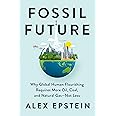
Similar items that may ship from close to you
 Fossil fuels are a uniquely cost-effective source of energy. Cost-effective energy is essential to human flourishing. Billions of people are suffering and dying for lack of cost-effective energy.Highlighted by 740 Kindle readers
Fossil fuels are a uniquely cost-effective source of energy. Cost-effective energy is essential to human flourishing. Billions of people are suffering and dying for lack of cost-effective energy.Highlighted by 740 Kindle readers The “listen to the scientists” refrain is almost always used to get us to accept a given policy evaluation without critical thinking. And this is what we must never do.Highlighted by 608 Kindle readers
The “listen to the scientists” refrain is almost always used to get us to accept a given policy evaluation without critical thinking. And this is what we must never do.Highlighted by 608 Kindle readers That failure is: opposing something on the basis of its side-effects without considering its massive benefits.Highlighted by 587 Kindle readers
That failure is: opposing something on the basis of its side-effects without considering its massive benefits.Highlighted by 587 Kindle readers
Editorial Reviews
About the Author
Product details
- Publisher : Portfolio (May 24, 2022)
- Language : English
- Hardcover : 480 pages
- ISBN-10 : 0593420411
- ISBN-13 : 978-0593420416
- Item Weight : 2.31 pounds
- Dimensions : 6.3 x 1.47 x 9.26 inches
- Best Sellers Rank: #39,022 in Books (See Top 100 in Books)
- #3 in Energy Policy (Books)
- #12 in Oil & Energy Industry (Books)
- #24 in Environmental Economics (Books)
- Customer Reviews:
About the author

Discover more of the author’s books, see similar authors, read author blogs and more
Customer reviews
Customer Reviews, including Product Star Ratings help customers to learn more about the product and decide whether it is the right product for them.
To calculate the overall star rating and percentage breakdown by star, we don’t use a simple average. Instead, our system considers things like how recent a review is and if the reviewer bought the item on Amazon. It also analyzed reviews to verify trustworthiness.
Learn more how customers reviews work on AmazonReviews with images
-
Top reviews
Top reviews from the United States
There was a problem filtering reviews right now. Please try again later.
His basic argument is the the current “climate change” orthodoxy (orthodoxy is my word, not his} completely ignores the benefits of fossil fuels, which benefits are cost-effective and essential to human flourishing. Instead, the current knowledge system (orthodoxy, I would say) catastrophizes fossil fuels side effects, which do exist. The current knowledge system distorts research on fossil fuels, promotes only “experts” who support these distortions, and refuses to consider any benefits of fossil fuels. He cites specific examples of these distortions.
The author argues that them knowledge system promotes a “delicate nuturer’ view of the environment with an “anti-impact” view of humans effect on the environment. I came to understand this to simply mean that the mainstream knowledge system views any human impact on the environment as undesirable. Human existence, let alone flourishing, is anathema to the mainstream knowledge system.
One example on page 373 of the book involves the argument by Paul Ehrlich and John Holdren opposing “plans for spreading industrial agriculture due to their use of fossil fuels.” Messrs. ehrlich and Holdren advocated “much greater use of human labor and relatively less dependence on heavy machinery and manufactured fertilizers and pesticides.” An unempowered life of agricultural drudgery, according to Messrs. Ehrlich and hOldren, doers less environmental damage. As Mr. Epstein notes: “Clearly they were not talking about the human environment, which is barely livable when farmers engage in manual labor agriculture. My family has some experience with this. My father grew up on a farm outside of Waco, Texas, in the 1920s and 1930s. In the 1950s and early 1960s, when I was a boy or early teenager, we would visit my paternal grandfather, who along with other members of the family lived in a wooden house with about 3 rooms. Water came from a cistern outside the house, the toilet was an outhouse, there was no air conditioning and heat was provided by a wood-burning pot bellied stove. Food was cooked in a wood-burning stove. There was a barn and a chicken coop and many other similar houses occupied by farm families nearby. By the late 1950s and 1960s electricity was coming to these small farms. Running water and sanitary sewer was a distant dream. I go to this area for an annual reunion and these little farm houses are gone. My cousins and all of their friends moved to Dallas, Houston, Waco, and other locales with the benefits provided by fossil fuels aa soon as they could. Since Messrs. Ehrlich and Holdren and other fellow-traveling ideologues idealize this existence so much perhaps they could be persuaded to adopt this lifestyle.
The book also looks at the opportunity to master climate challenges through the use of the tools enabled by fossil fuels. There are reports of wildfires, droughts, and floods which sometimes create great hardship for humans. This cannot be disputed. The book looks at the statistics on losses from environmental disasters now and in the past, with losses declining with the expansion of the use of fossil fuels. You can go through the book, look at the citations and do your own research if you wish, but I would discourage simply the accepting the current orthodoxy and being dismissive of the book’s claims. Many of the wildfires in California now are due to poor “green” governmental policies. California has just now passed a law that will make it illegal to sell a gas-powered vehicle by 2035. Unfortunately, their “green” electric grid is also undergoing stress and has banned charging of electric vehicles.
The war on fossil fuels has also included a war on the use of nuclear reactors. I read recently that Japan, notwithstanding Fukushima, is looking at nuclear power to provide reliable electricity for the Japanese. Germany,, and Europe generally, is beginning to look at nuclear and coal for reliable electricity. China has built many new coal power plants to provide power to its people. Keep in mind that political elites first and primary goal is to remain in power and if too many people are freezing or have no job because there is no power, the goal of remaining in power could be threatened. Wind and solar are not reliable. They can, and should, provide electricity for the grid, but probably don’t constitute the sole answer to power needs.
On page 127, the author looks at the miracle of being able to travel by private jet. Al Gore gets a mention in several places in the book. I encountered one pilot who had flown Mr. Gore and 3-4 associates from Nashville, Tennessee, to Central dna South America and then back to Nashville. I expect that created a lot of CO2 for very few people. This flight was well after Mr. Gore became Mr. Global Warming. It simply is one example of where elites dictate rules for others that they themselves don’t wish to follow. I’m sure Mr. Gore is not the only person promoting global warming/climate change who believes and acts as if these dictates apply to the little people, which includes the author of this book, the readers of the book and anyone else not within the elite.
The book takes a while to read and It repeats itself at times, but it makes a cogent argument. My one criticism is that he never engages the reason “why” the current knowledge system takes this approach. I think it is because the current elites think that there are simply too many people on the earth and the herd needs substantial thinning. Ergo,, the book’s argument for “human flourishing” is not what’s is desired.
If the topic interests you, I recommend the book strongly.
Alex Epstein lays out a case that the true benefits are enormous and the true costs are manageable, sometimes to the point of only mild impacts.
I don't have the expertise to pass definitive judgment on Epstein's claims but what I'll call the enormous true benefits side of the case seems very strong and straightforward.
What I'll call the manageable true costs side of the case also seems rather strong to me, but I would frankly urge readers to buy this book to engage with Epstein's argumentation, especially on the issue of the possible cost frequently known as Catastrophic Anthropogenic Global Warming ("CAGW"). (Epstein doesn't use this particular phrase/acronym but to me it's a fairly widespread term of convenience to describe what folks usually really mean when they talk about "global warming" or "climate change".)
CAGW may be caused by humans putting too much CO2 into the atmosphere, thereby triggering harmful greenhouse effects. Of course natural climate change, of which global warming seems to be a current trend, is always in play, but the whole point of this discussion is that we are directing our collective attention to the climate change that we may be causing -- anthropogenic -- and which may be very harmful -- catastrophic -- to ourselves and the planet.
In order to start the ball rolling on this engagement with Epstein's thinking, let me lay out some of his main points about the greenhouse effects from chapter 9, "Rising CO2 Levels: The Full Context".
Epstein proposes that there are two possible types of greenhouse effects: first, a well-documented & mild greenhouse effect due solely to increases in CO2; and second, a speculative, "significantly amplified" greenhouse effect that would be caused by the impact of increased CO2 in turn causing a massive increase in production of water vapor (which is another greenhouse gas). I'll call the first type the direct greenhouse effect and the second type the significantly amplified greenhouse effect. The significantly amplified effect includes the direct effect as a pre-condition.
Epstein proposes four points squarely relating to the direct greenhouse effect, that there are "four basic truths about the history of climate" that lead him to conclude we are not headed for a CAGW disaster.
"1. The global climate system is near historic lows in CO2 and temperature. 2. We have no near-term mechanism of reaching even one fourth the historical high of CO2. 3. Life on Earth thrived at far higher CO2 levels and temperatures in the past. 4. Planetary warming is concentrated in colder parts of the Earth -- it is not truly global."
Further to these points is the "unanimous consent in mainstream climate science" that the relationship of increasing CO2 to increasing the direct greenhouse effect is a "diminishing, logarithmic effect", such that the greenhouse effect "from CO2 by itself translates into about 1o C every time the amount of CO2 in the atmosphere doubles." The attached graph may help illustrate this proposed effect.
So Epstein writes that the first type of greenhouse effect -- the CO2 greenhouse effect -- is "a diminishing effect that on its own would not lead us to expect concerning warming in the future."
Concerning the second type of greenhouse effect, he continues, "Claims that warming will be far more rapid than the [direct] greenhouse effect suggests are based on a significantly amplified greenhouse effect."
And more: "The main mechanism posited is that the greenhouse effect of CO2 in the atmosphere will greatly amplify water vapor creation in the atmosphere, which could cause much more warming than the CO2 acting alone would. This kind of reinforcing interaction is called a positive feedback loop."
But: "There are three crucial things to recognize about the positive feedback loops that supposedly contribute to a significantly amplified greenhouse effect: (1) they are limited by the diminishing nature of the [direct] greenhouse effect, (2) even extreme projections of warming would be masterable, and (3) the extreme projections are highly speculative and unlikely to come true."
I hope that this small sample of Epstein's thinking -- as clumsily rephrased by me -- will prompt you to get this book and study it. The stakes are enormous and the more eyes we have on these issues the better.
Reviewed in the United States on June 17, 2022
Alex Epstein lays out a case that the true benefits are enormous and the true costs are manageable, sometimes to the point of only mild impacts.
I don't have the expertise to pass definitive judgment on Epstein's claims but what I'll call the enormous true benefits side of the case seems very strong and straightforward.
What I'll call the manageable true costs side of the case also seems rather strong to me, but I would frankly urge readers to buy this book to engage with Epstein's argumentation, especially on the issue of the possible cost frequently known as Catastrophic Anthropogenic Global Warming ("CAGW"). (Epstein doesn't use this particular phrase/acronym but to me it's a fairly widespread term of convenience to describe what folks usually really mean when they talk about "global warming" or "climate change".)
CAGW may be caused by humans putting too much CO2 into the atmosphere, thereby triggering harmful greenhouse effects. Of course natural climate change, of which global warming seems to be a current trend, is always in play, but the whole point of this discussion is that we are directing our collective attention to the climate change that we may be causing -- anthropogenic -- and which may be very harmful -- catastrophic -- to ourselves and the planet.
In order to start the ball rolling on this engagement with Epstein's thinking, let me lay out some of his main points about the greenhouse effects from chapter 9, "Rising CO2 Levels: The Full Context".
Epstein proposes that there are two possible types of greenhouse effects: first, a well-documented & mild greenhouse effect due solely to increases in CO2; and second, a speculative, "significantly amplified" greenhouse effect that would be caused by the impact of increased CO2 in turn causing a massive increase in production of water vapor (which is another greenhouse gas). I'll call the first type the direct greenhouse effect and the second type the significantly amplified greenhouse effect. The significantly amplified effect includes the direct effect as a pre-condition.
Epstein proposes four points squarely relating to the direct greenhouse effect, that there are "four basic truths about the history of climate" that lead him to conclude we are not headed for a CAGW disaster.
"1. The global climate system is near historic lows in CO2 and temperature. 2. We have no near-term mechanism of reaching even one fourth the historical high of CO2. 3. Life on Earth thrived at far higher CO2 levels and temperatures in the past. 4. Planetary warming is concentrated in colder parts of the Earth -- it is not truly global."
Further to these points is the "unanimous consent in mainstream climate science" that the relationship of increasing CO2 to increasing the direct greenhouse effect is a "diminishing, logarithmic effect", such that the greenhouse effect "from CO2 by itself translates into about 1o C every time the amount of CO2 in the atmosphere doubles." The attached graph may help illustrate this proposed effect.
So Epstein writes that the first type of greenhouse effect -- the CO2 greenhouse effect -- is "a diminishing effect that on its own would not lead us to expect concerning warming in the future."
Concerning the second type of greenhouse effect, he continues, "Claims that warming will be far more rapid than the [direct] greenhouse effect suggests are based on a significantly amplified greenhouse effect."
And more: "The main mechanism posited is that the greenhouse effect of CO2 in the atmosphere will greatly amplify water vapor creation in the atmosphere, which could cause much more warming than the CO2 acting alone would. This kind of reinforcing interaction is called a positive feedback loop."
But: "There are three crucial things to recognize about the positive feedback loops that supposedly contribute to a significantly amplified greenhouse effect: (1) they are limited by the diminishing nature of the [direct] greenhouse effect, (2) even extreme projections of warming would be masterable, and (3) the extreme projections are highly speculative and unlikely to come true."
I hope that this small sample of Epstein's thinking -- as clumsily rephrased by me -- will prompt you to get this book and study it. The stakes are enormous and the more eyes we have on these issues the better.

Top reviews from other countries
I have read in other places that the ‘Summary for Policy Makers’ does not always accurately capture what the IPCC truly means. Deeper into AR6 content (Section 2.3.1.1.2, page 35) I found the following:
“To conclude, following approximately 6ka (6000 years), GMST (Global Mean Surface Temperature) generally decreased, culminating in the coldest multi-century interval of the post-glacial period (since 8ka), which occurred between around 1450 and 1850 (high confidence). This multi-millennial cooling trend was reversed in the mid-19th century. Since around 1950, GMST has increased at an observed rate unprecedented for any 50-year period in at least the last 2000 years (medium confidence).”
That last sentence from the actual AR6 report reads very close to what is given above in the Summary for Policy Makers. Just two minor differences separate the two. The AR6 chapter 2 sentence does not say that the warming rate is due to human influence. Second, only medium confidence is given to the claim that the warming rate is unprecedented for the past 2000 years.
Medium confidence exists in the middle of a spectrum that contains the qualifiers ‘very low’, ‘low’, ‘medium’, ‘high’, ‘very high’. Given the ‘middle of the road’ conclusion of AR6, a more balanced Summary for Policy Makers should read:
It is likely that in these past 70 years the global mean surface temperature has risen at a rate never experienced at any other time in the past 2000 years. True also, however, that it is equally likely that at some time much before the start of the industrial revolution (~ 1850) global mean surface temperature experienced a rate of change never experienced at any time over this same 2000-year stretch.
The omission from the policy summary of the uncertainty in the claim (medium confidence) is deceitful and of grave consequence. By IPCC’s own standards, the current temperature rise may not be extreme, and may not be of an anthropogenic nature. Consequently, the global drive toward eliminating fossil fuels to stop the average global temperature rise is as likely to be wrong as right.
The many benefits of fossil fuels have been known for over a century. However, what is bad about their carbon dioxide emissions remains uncertain.


